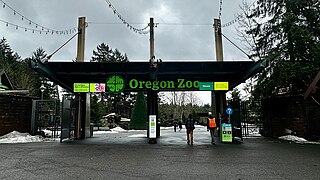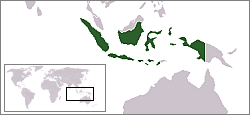Related Research Articles

Forensic science, also known as criminalistics, is the application of science principles and methods to support legal decision-making in matters of criminal and civil law.

CSI: Crime Scene Investigation, also referred to as CSI and CSI: Las Vegas, is an American procedural forensics crime drama television series that ran on CBS from October 6, 2000, to September 27, 2015, spanning 15 seasons. This was the first in the CSI franchise, and starred William Petersen, Marg Helgenberger, Gary Dourdan, George Eads, Jorja Fox, Ted Danson, Laurence Fishburne, Elisabeth Shue and Paul Guilfoyle. The series concluded with a feature-length finale, "Immortality". A follow-up series, CSI: Vegas, premiered in 2021.

The Oregon Zoo, originally the Portland Zoo and later the Washington Park Zoo, is a zoo located in Washington Park, Portland, Oregon, approximately 2 miles (3.2 km) southwest of downtown Portland. Founded in 1888, it is the oldest zoo west of the Mississippi River.

Jorja Fox is an American actress. She first came to prominence with a recurring role in the NBC medical drama ER as Dr. Maggie Doyle from 1996 to 1999. This was followed by another critical success in the recurring role of Secret Service Agent Gina Toscano in the NBC political drama The West Wing in 2000. She played Sara Sidle in the CBS police procedural crime-drama CSI: Crime Scene Investigation, both as a regular and recurring (2008–2010) cast member. She reprised the role in the sequel CSI: Vegas, which premiered on October 6, 2021.

The CSI effect describes the various ways in which the exaggerated portrayal of forensic science on crime television shows such as CSI: Crime Scene Investigation influences public perception. The term was first reported in a 2004 USA Today article describing the effect being made on trial jurors by television programs featuring forensic science.
A crime laboratory, often shortened to crime lab, is a scientific laboratory, using primarily forensic science for the purpose of examining evidence from criminal cases.
The following outline is provided as an overview of and topical guide to forensic science:

CSI is a media franchise of American television series created by Anthony E. Zuiker. The first three CSI series follow the work of forensic scientists as they unveil the circumstances behind mysterious deaths, while the fourth series, CSI: Cyber, emphasizes behavioral psychology and how it can be applied to cyber forensics.
CSI: The Experience is a traveling exhibition about crime lab forensic science and technology inspired by the television series CSI: Crime Scene Investigation.

The environment of Indonesia consists of 17,508 islands scattered over both sides of the equator. Indonesia's size, tropical climate, and archipelagic geography, support the world's second highest level of biodiversity after Brazil.

An endangered species is a species that is very likely to become extinct in the near future, either worldwide or in a particular political jurisdiction. Endangered species may be at risk due to factors such as habitat loss, poaching, and invasive species. The International Union for Conservation of Nature (IUCN) Red List lists the global conservation status of many species, and various other agencies assess the status of species within particular areas. Many nations have laws that protect conservation-reliant species which, for example, forbid hunting, restrict land development, or create protected areas. Some endangered species are the target of extensive conservation efforts such as captive breeding and habitat restoration.

The University of Florida's (UF) online forensic science distance education programs cater to working professionals and students who have completed their Bachelor of Science degrees.

Wildlife smuggling or wildlife trafficking concerns the illegal gathering and trade of endangered species and protected wildlife, including plants and byproducts or products utilizing a species. Research on wildlife smuggling has increased, however, knowledge of the illicit trade remains limited. The differences between international policies and tendencies likely contribute to the extensive estimated range of wildlife smuggling, anywhere from $5-$23 billion, with an additional $67-$193 billion when timber and fish are included. The prolific growth of wildlife smuggling makes it the fourth-largest criminal enterprise globally after drug, firearm, and human trafficking. Products demanded by the trade include but are not limited to ivory, bushmeat, traditional medicine, and exotic pets. China and the United States are the largest buyers in the illegal wildlife trade. It often involves other illegal activities such as tranquilizing animals without proper authorization.

The Poisoner's Handbook: Murder and the Birth of Forensic Medicine in Jazz Age New York is a New York Times best-selling non-fiction book by Pulitzer Prize-winning science writer Deborah Blum that was released by Penguin Press in 2010.

Deforestation in Borneo has taken place on an industrial scale since the 1960s. Borneo, the third largest island in the world, divided between Indonesia, Malaysia and Brunei, was once covered by dense tropical and subtropical rainforests.
The Freeland Foundation is an international NGO headquartered in Bangkok which works in Asia on environmental conservation and on human rights. The organization intends to stop wildlife and human trafficking.
The ASEAN Wildlife Enforcement Network (ASEAN-WEN) was officially launched on 1 December 2005, as a regional inter-agency and inter-governmental initiative to counter the illegal cross-border trade in endangered flora and fauna. It helps countries share information on and tackle cross-border wildlife crime and facilitates the exchange of regional best practices in combating those crimes. As the world's largest wildlife law enforcement network, it comprises the law enforcement agencies of the 10 ASEAN countries forming a regional intergovernmental law-enforcement network.

The United States Fish and Wildlife Service Office of Law Enforcement contributes to Service efforts to manage ecosystems, save endangered species, conserve migratory birds, preserve wildlife habitat, restore fisheries, combat invasive species, and promote international wildlife conservation. It is an office of the United States Fish and Wildlife Service (FWS).

Wildlife forensic science is forensic science applied to legal issues involving wildlife. Wildlife forensic sciences also deal with conservation and identification of rare species and is a useful tool for non-invasive studies. Methods can be used to determine relatedness of the animals in the area allowing them to determine rare and endangered species that are candidates for genetic rescue. Techniques using things such as the SSCP or Single-Strand Conformational Polymorphism gel electrophoresis technique, microscopy, DNA barcoding, Mitochondrial Microsatellite Analysis and some DNA and Isotope analysis can identify species and individual animals in most cases if they have already been captured. Unlike human identification, animal identification requires determination of its family, genus, and species, and sex in order to individualize the animal, typically through the use of DNA based analyses.
The Elephant Action League (EAL) is an environmental non-governmental organization founded in 2013 in the United States by Andrea Crosta, Gilda Moratti, and Francesco Rocca. EAL is based in Los Angeles, California.
References
- ↑ "Laurel Neme biography". Archived from the original on July 28, 2011. Retrieved August 1, 2010.
- ↑ "Laurel A. Neme". Simon & Schuster.
- ↑ Lindholm, Jane (April 17, 2009). "VT Edition: Dr. Laurel Neme & Col. David LeCours on illegal wildlife trafficking". Vermont Public Radio.
- ↑ CSI: Animal Kingdom. Talk of the Nation . NPR. May 1, 2009.
- ↑ Suddath, Claire (April 17, 2009). "Investigating Animal Crimes". Time Magazine. Archived from the original on April 18, 2009.
- ↑ Denson, Bryan (June 8, 2009). "Bad guys who hurt animals? Ashland forensics lab is on the hunt". The Oregonian . Retrieved January 26, 2024.
- ↑ Belli, Brita (January 20, 2011). "Animal Investigators: How the World's First Wildlife Forensics Lab Is Solving Crimes and Saving Endangered Species". E–The Environmental Magazine .
- ↑ Nicholls, Henry (March 25, 2009). "Review: Animal Investigators by Laurel A. Neme" . New Scientist . Retrieved January 26, 2024.
- ↑ Wilson-Wilde, Linzi (December 2009). "Animal Investigators – How the World's First Wildlife Forensics Lab is Solving Crimes and Saving Endangered Species" . Australian Journal of Forensic Sciences . Australian Academy of Forensic Sciences. 41 (2): 165–166. doi:10.1080/00450610903085901. S2CID 84420259.
- ↑ Robinson, Ann (April 17, 2009). "Nonfiction review: "Animal Investigators"". The Oregonian . Retrieved January 26, 2024.
- ↑ "Forum Biographies - Laurel Neme". IUCN 2003 World Parks Congress AHEAD Launch Forum.
- ↑ Neme, Laurel (June 27, 2010). "Tiger farming and traditional Chinese medicine". Mongabay .
- ↑ "Laurel Neme – Wildlife Author".
- ↑ Neme, Laurel (May 30, 2010). "Mexico has big role in the illegal parrot trade". Mongabay .
- ↑ "Orangutan Houdini". Kirkus Reviews . July 16, 2014. Retrieved January 26, 2024.
- 1 2 "The Elephant's New Shoe". Kirkus Reviews . May 2, 2020. Retrieved January 26, 2024.
- ↑ Lodge, Sally (February 7, 2020). "The Whole Wide World: Earth Day 2020". Publishers Weekly . Retrieved January 26, 2024.